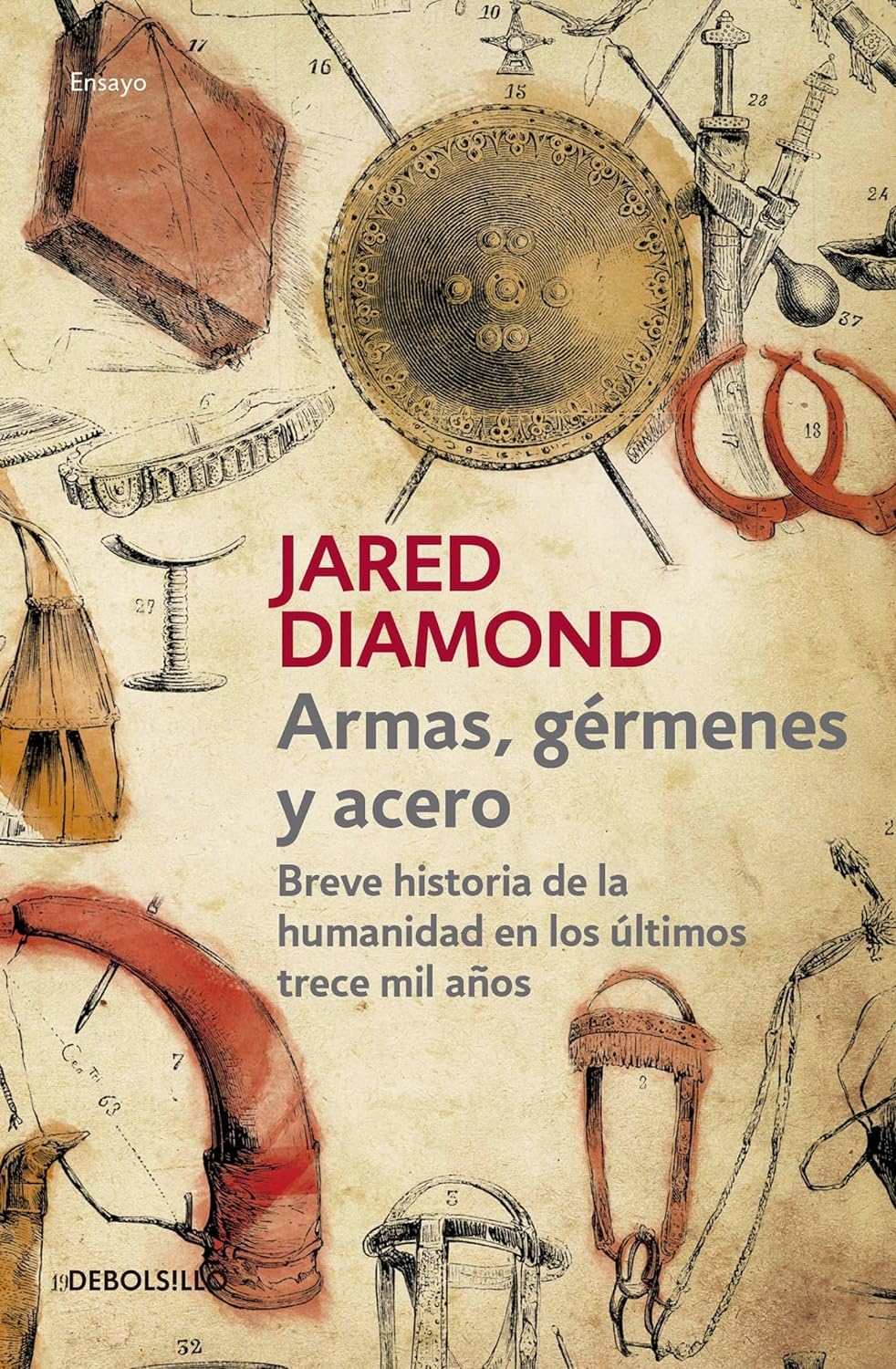Armas, germenes y acero / Guns, Germs, and Steel: The Fates of Human Societies (Spanish Edition)
Armas, germenes y acero / Guns, Germs, and Steel: The Fates of Human Societies (Spanish Edition)
Couldn't load pickup availability
Share
Sin embargo, los origenes localizados de la agricultura y la ganaderia son solo parte de la explicacion de los diferentes destinos de los pueblos. Las sociedades que superaron esta fase de cazadores-recolectores se encontraron con mas posibilidades para desarrollar la escritura, la tecnologia o las estructuras politicas; ademas de sobrevivir a germenes nocivos y crear poderosas armas belicas.
En este libro, el profesor Jared Diamond demuestra que la diversidad cultural hunde sus raices en las diferencias geograficas, ecologicas y territoriales ligadas a cada caso concreto, y analiza como evoluciono la humanidad y por que unos pueblos avanzaron hacia la civilizacion mientras que otros se quedaron estancados.
ENGLISH DESCRIPTION
"Fascinating.... Lays a foundation for understanding human history."Bill Gates
In this "artful, informative, and delightful" (William H. McNeill, New York Review of Books) book, Jared Diamond convincingly argues that geographical and environmental factors shaped the modern world. Societies that had had a head start in food production advanced beyond the hunter-gatherer stage, and then developed religion --as well as nasty germs and potent weapons of war --and adventured on sea and land to conquer and decimate preliterate cultures. A major advance in our understanding of human societies, Guns, Germs, and Steel chronicles the way that the modern world came to be and stunningly dismantles racially based theories of human history. Winner of the Pulitzer Prize, the Phi Beta Kappa Award in Science, the Rhone-Poulenc Prize, and the Commonwealth club of California's Gold Medal.

Editorial Reviews
"Artful, informative, and delightful.... There is nothing like a radically new angle of vision for bringing out unsuspected dimensions of a subject, and that is what Jared Diamond has done."―William H. McNeil,New York Review of Books
"An ambitious, highly important book."―James Shreeve, New York Times Book Review
"A book of remarkable scope, a history of the world in less than 500 pages which succeeds admirably, where so many others have failed, in analyzing some of the basic workings of culture process.... One of the most important and readable works on the human past published in recent years."―Colin Renfrew, Nature
"The scope and the explanatory power of this book are astounding."―The New Yorker
"No scientist brings more experience from the laboratory and field, none thinks more deeply about social issues or addresses them with greater clarity, than Jared Diamond as illustrated byGuns, Germs, and Steel. In this remarkably readable book he shows how history and biology can enrich one another to produce a deeper understanding of the human condition."―Edward O. Wilson, Pellegrino University Professor, Harvard University
"Serious, groundbreaking biological studies of human history only seem to come along once every generation or so. . . . Now [Guns, Germs, and Steel] must be added to their select number. . . . Diamond meshes technological mastery with historical sweep, anecdotal delight with broad conceptual vision, and command of sources with creative leaps. No finer work of its kind has been published this year, or for many past."―Martin Sieff,Washington Times
"[Diamond] is broadly erudite, writes in a style that pleasantly expresses scientific concepts in vernacular American English, and deals almost exclusively in questions that should interest everyone concerned about how humanity has developed. . . . [He] has done us all a great favor by supplying a rock-solid alternative to the racist answer. . . . A wonderfully interesting book."―Alfred W. Crosby, Los Angeles Times
"An epochal work. Diamond has written a summary of human history that can be accounted, for the time being, as Darwinian in its authority."―Thomas M. Disch,The New Leader
About the Author
Jared Diamond (1937) es catedrático de geografía en la Universidad de California (UCLA). Comenzó su actividad científica en el campo de la fisiología evolutiva y la biogeografía. Ha sido elegido miembro de la Academia de Artes y Ciencias, de la Academia Nacional de Ciencias y de la Sociedad Filosófica de Estados Unidos, y ha recibido una beca de investigación de la Fundación MacArthur, además de los premios Burr de la Sociedad Geográfica Nacional y Pulitzer de 1998 porArmas, gérmenes y acero(1997). Ha publicado más de seiscientos artículos en las revistas Discover, Natural History, Nature y Geo. También es autor deEl tercer chimpancé(1994),¿Por qué es divertido el sexo?(1999),Colapso(2006),El mundo hasta ayer(2013) ySociedades comparadas(Debate, 2016) grandes éxitos que han obtenido, además, numerosos galardones.
Jared Diamond is professor of geography at UCLA and author of the best-selling Collapse and The Third Chimpanzee. He is a MacArthur Fellow and was awarded the National Medal of Science.
Product details
-
Publication
Debolsillo
-
Author
-
Language
Spanish
Lexile:
-
Pages
592
-
ISBN-13
9786073139250


